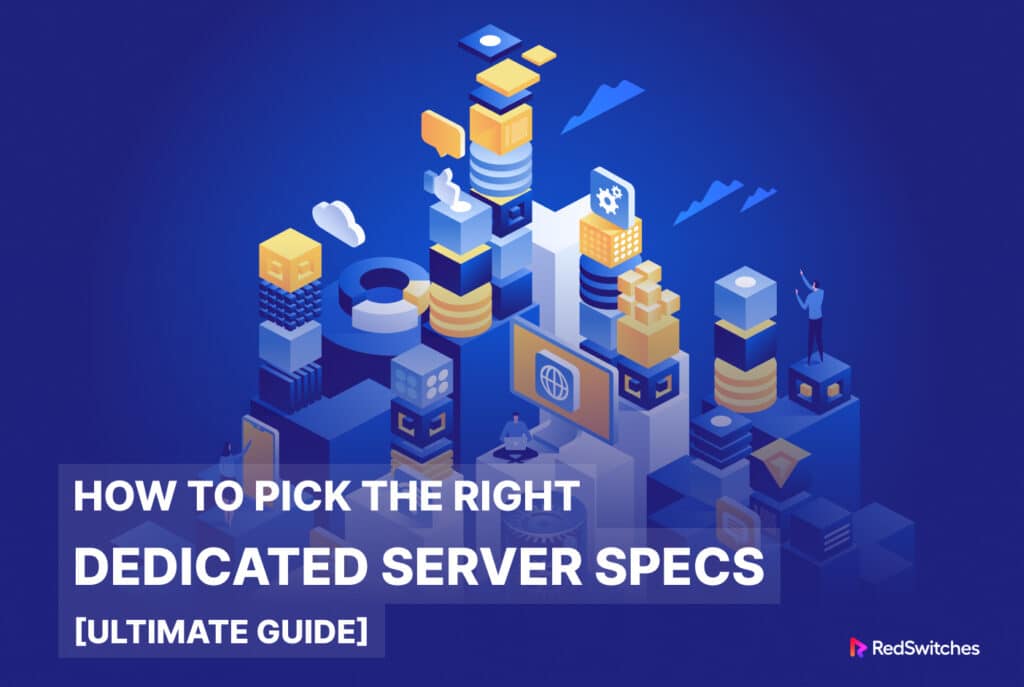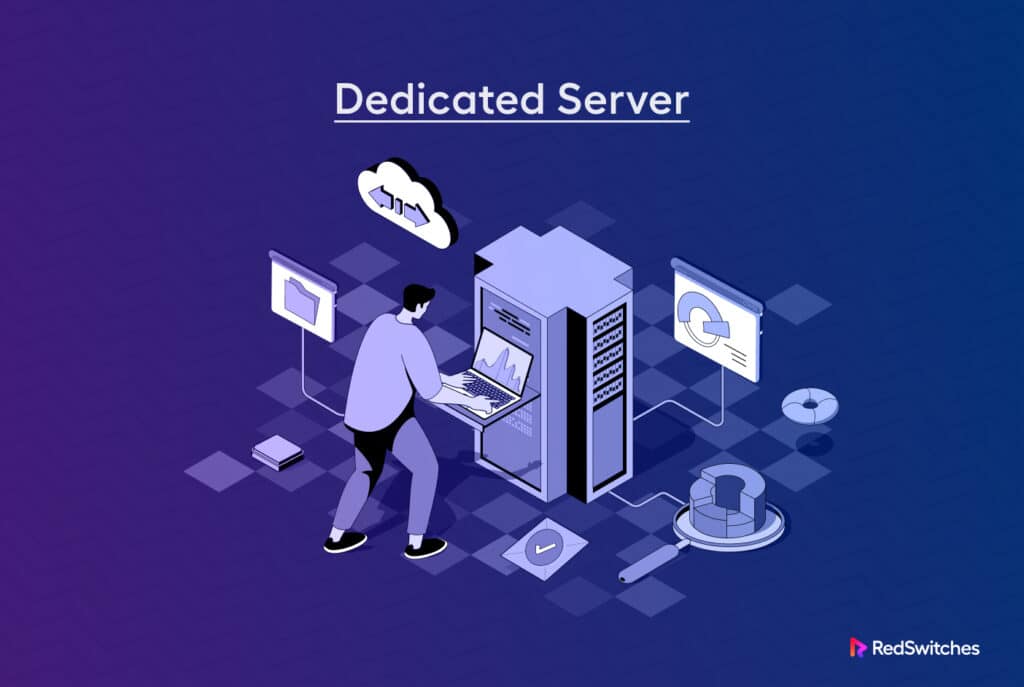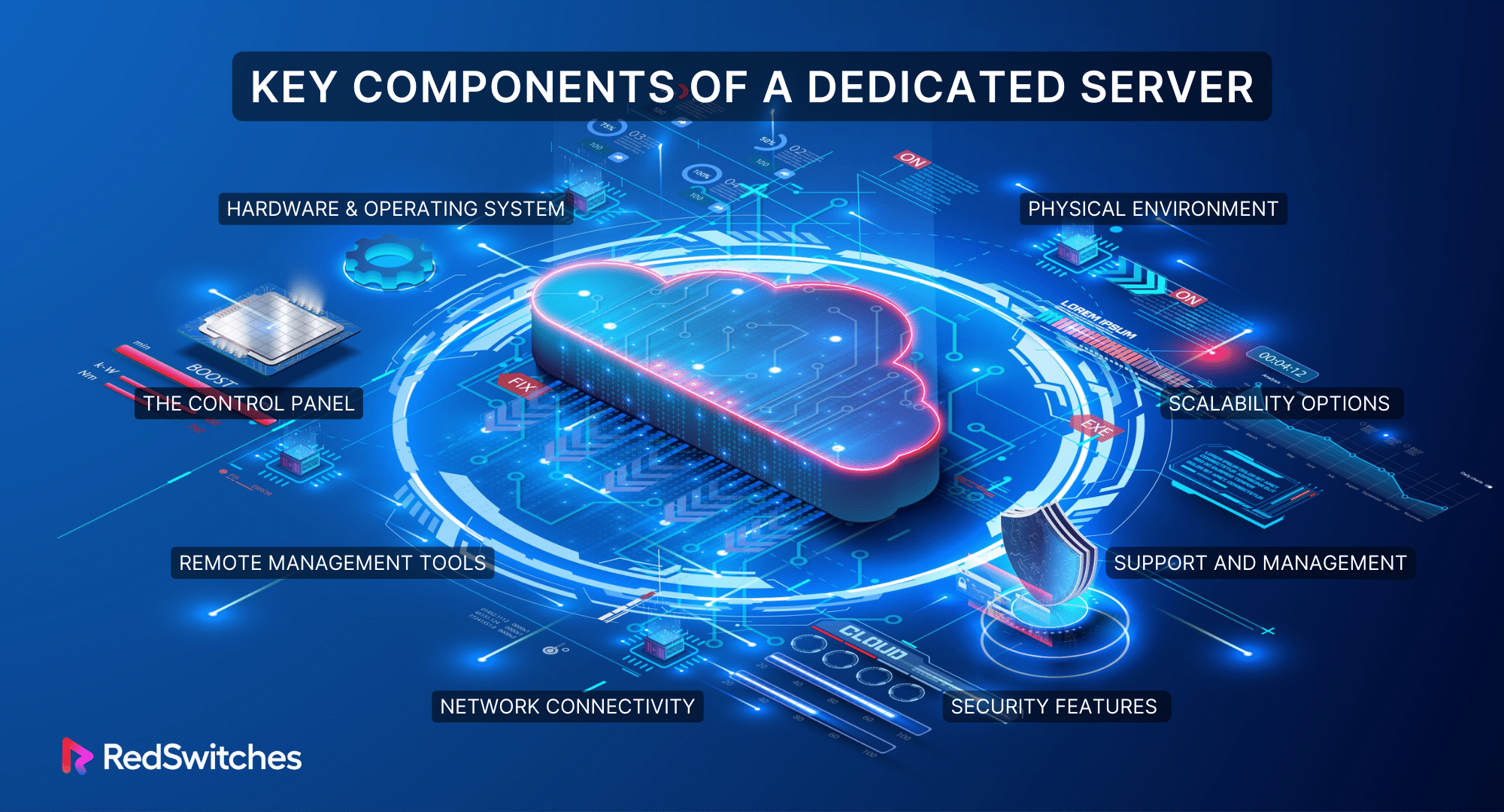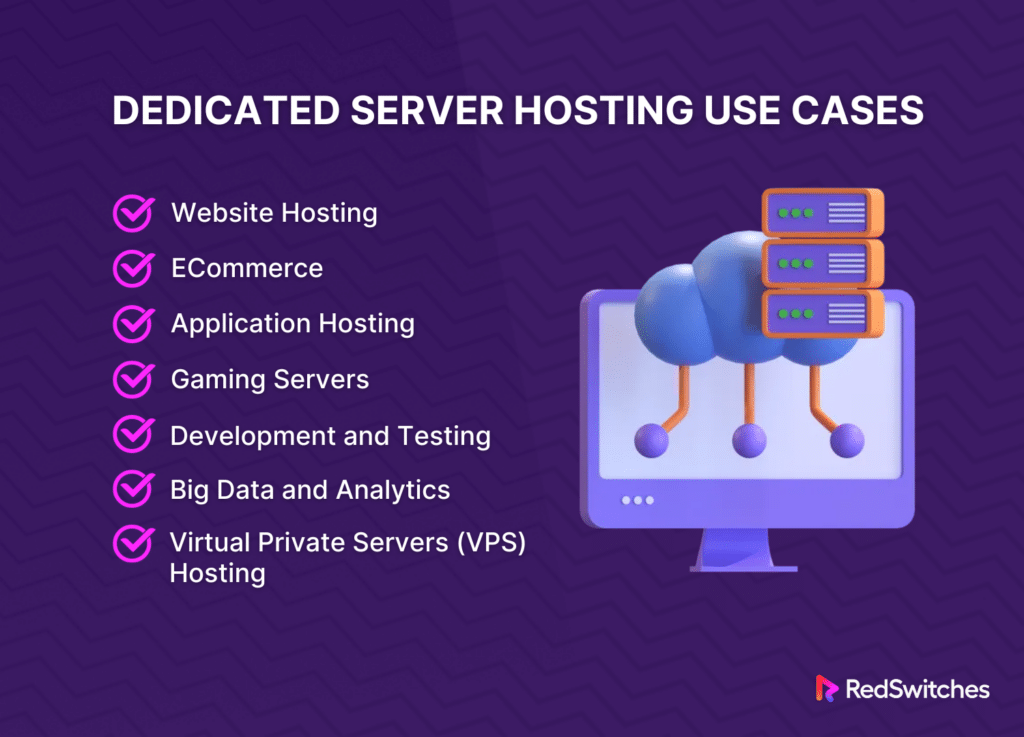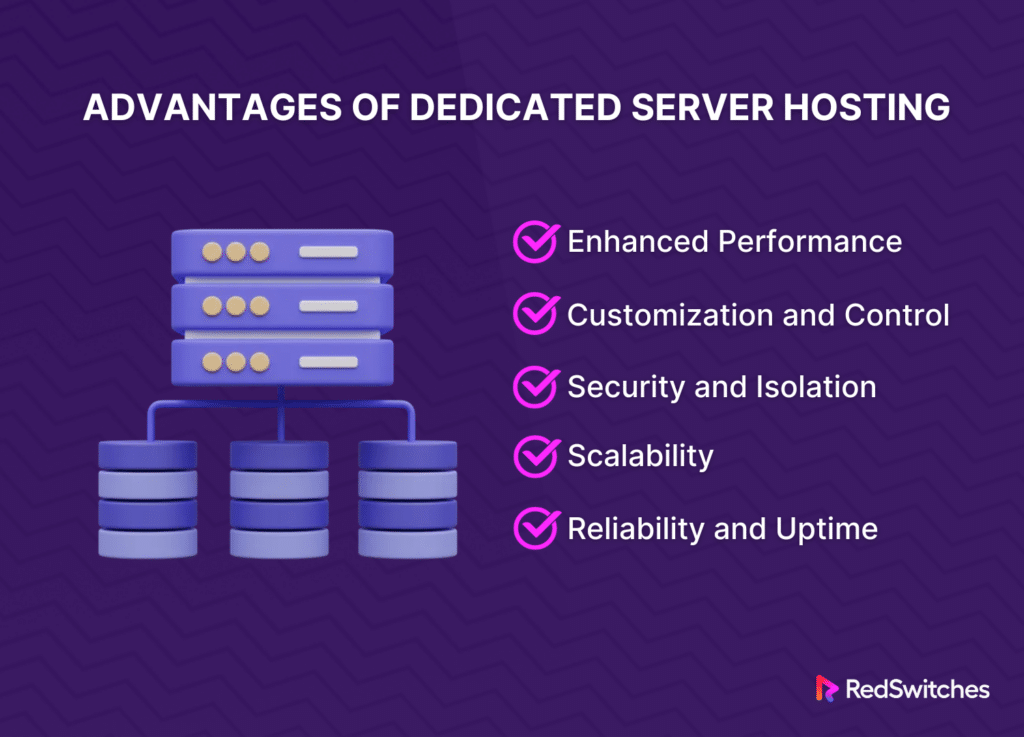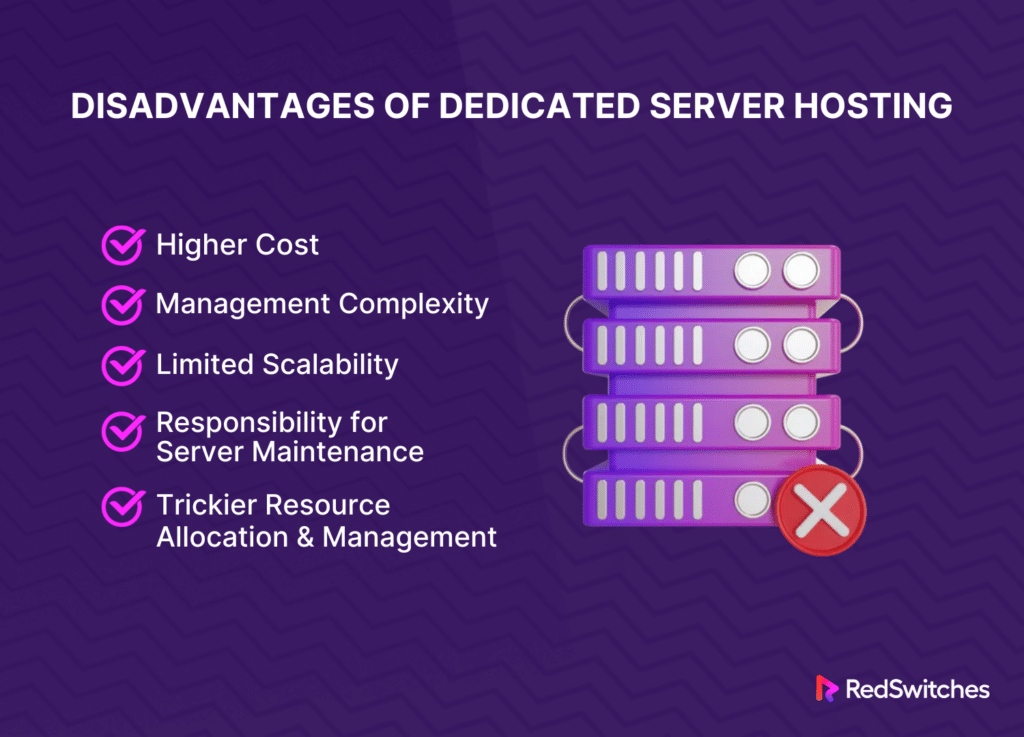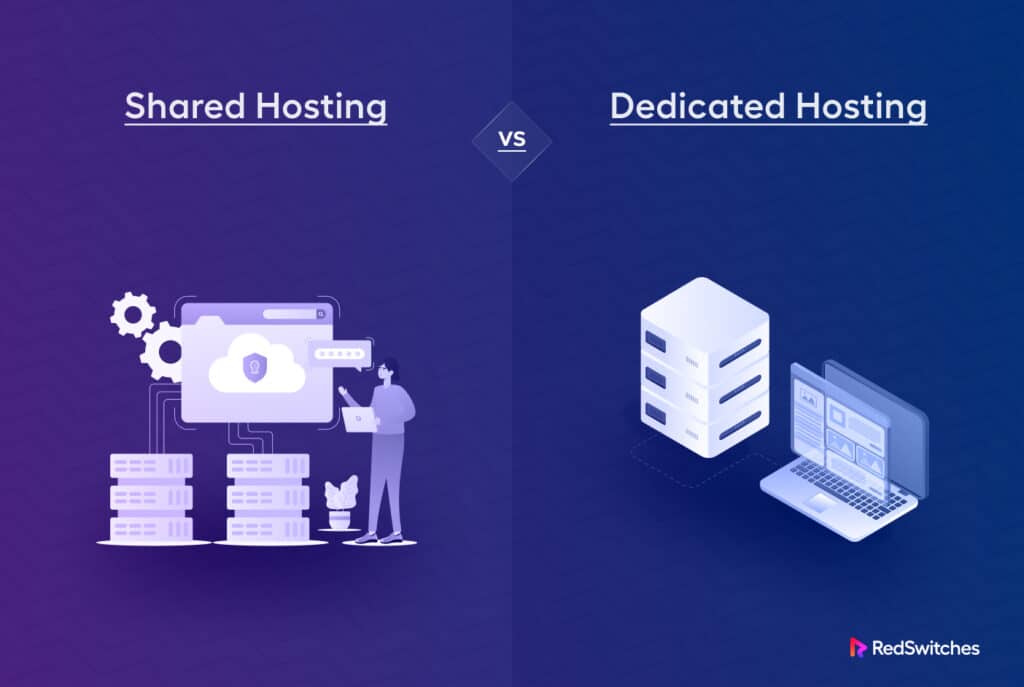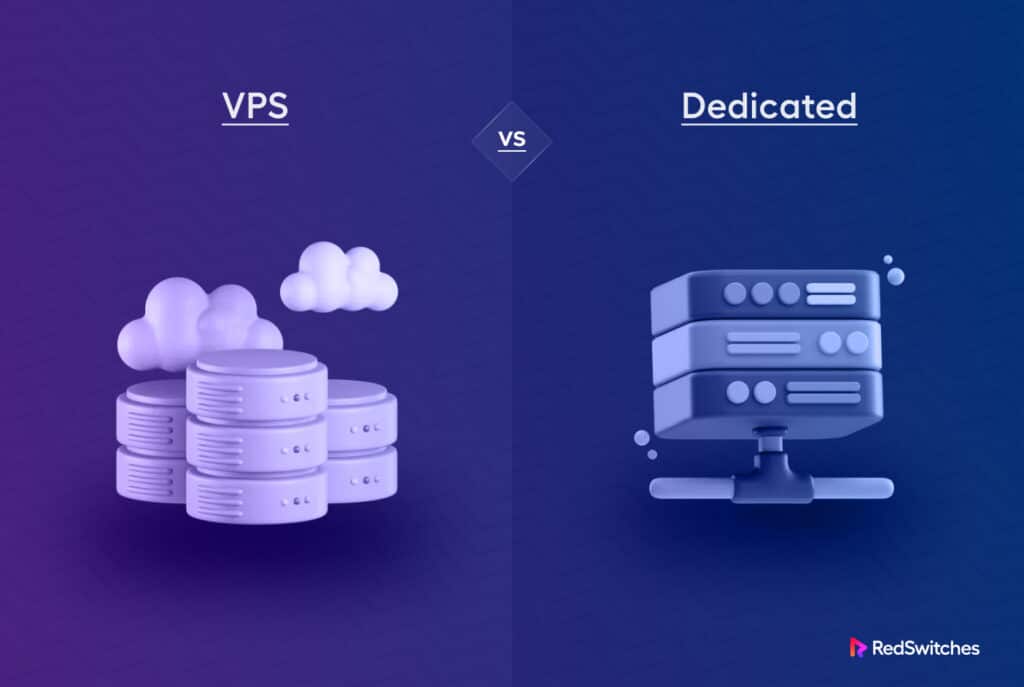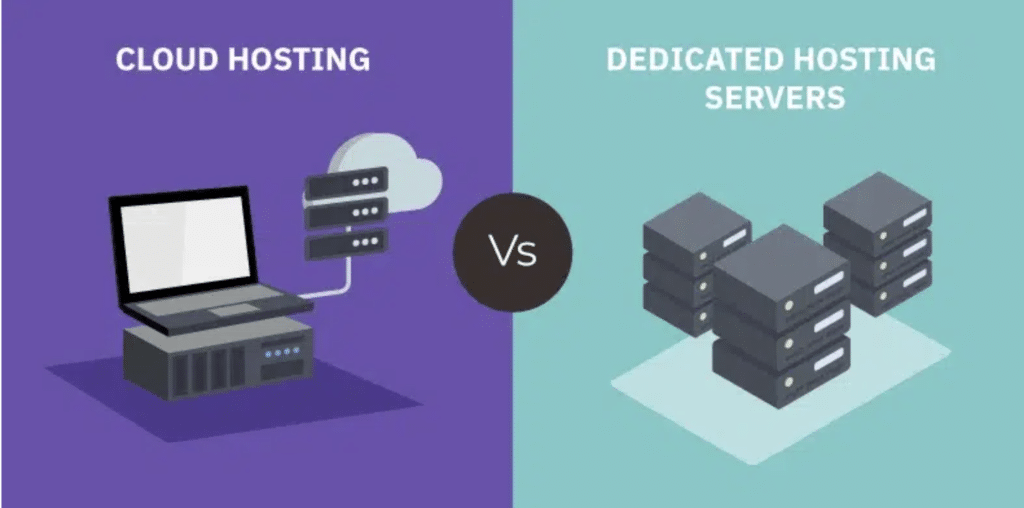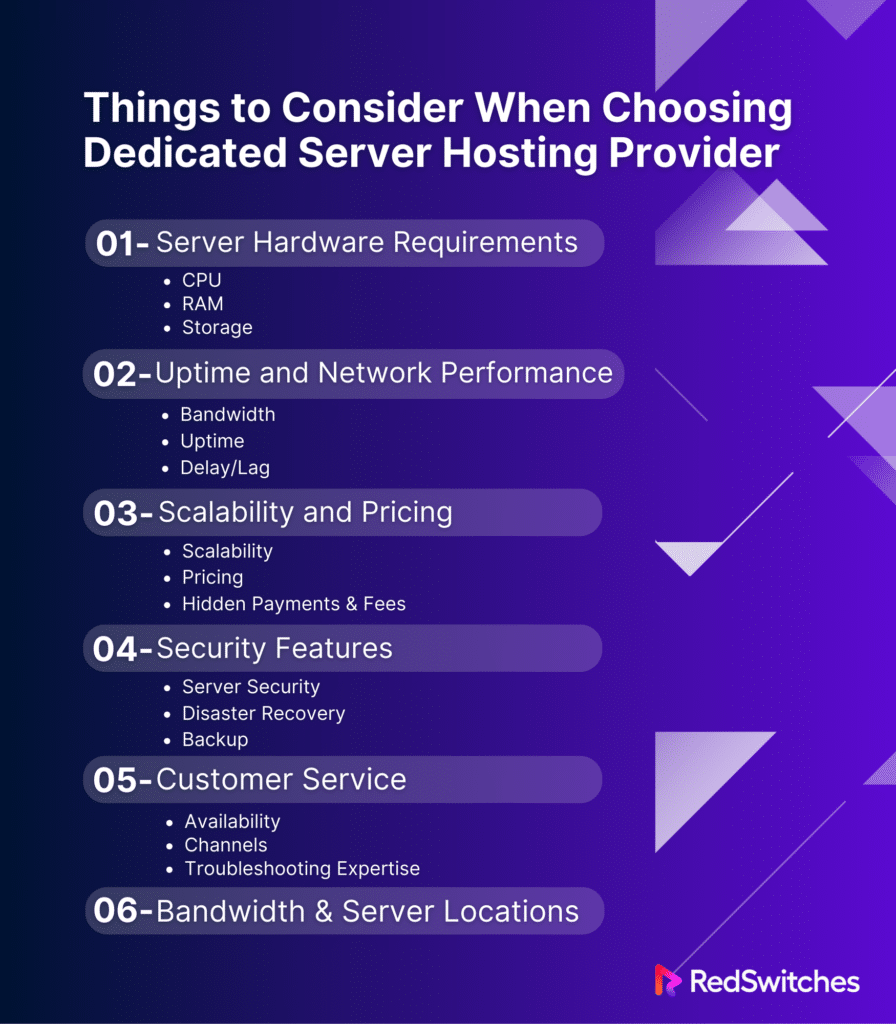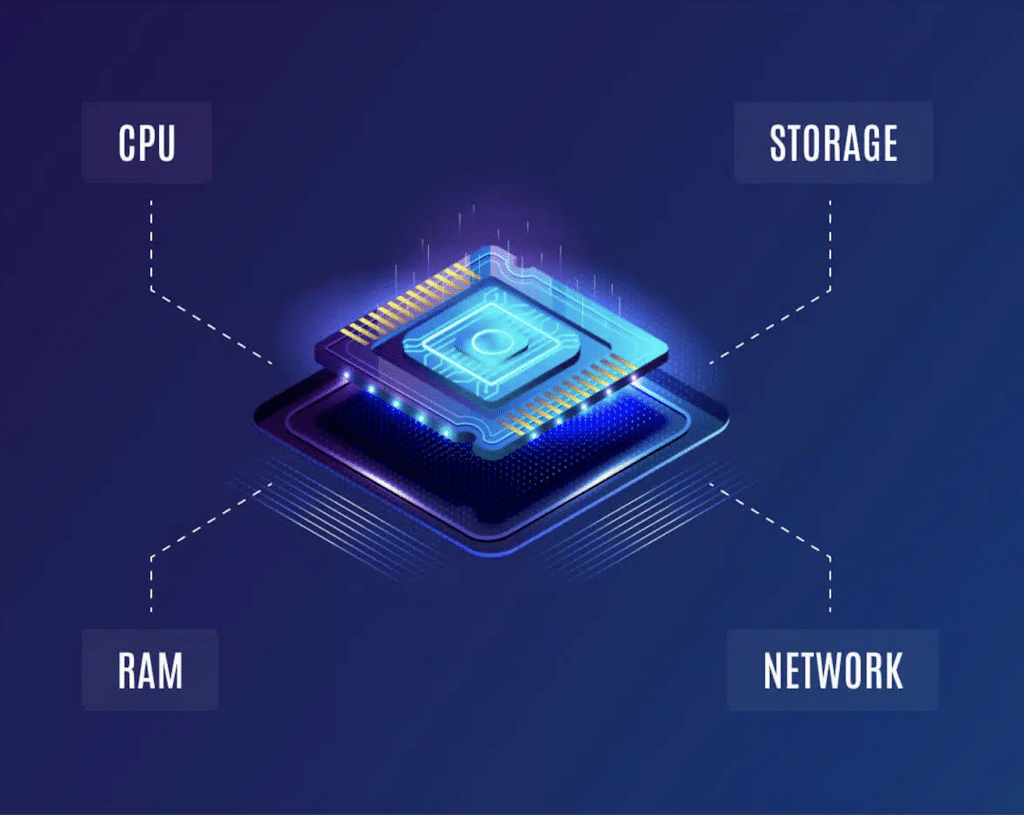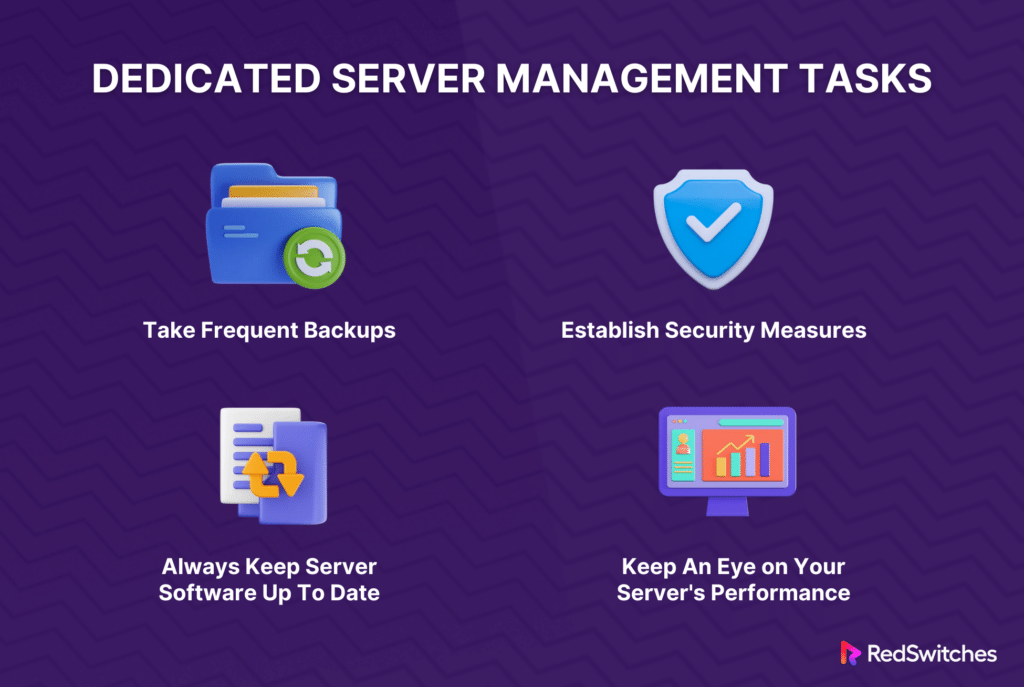Choosing the right dedicated server specs can challenge both novices and experienced. With so many hardware and networking configuration options, users often struggle to pick the server specifications that match their specific project requirements.
That’s why, when deciding server specs, many users get stuck with questions such as: How much RAM will I need? Is 4TB of storage enough? Do I need unmetered bandwidth?
In this article, we’ll answer all these questions and help you pick the right dedicated server specifications for your projects. Read on to learn how to choose your ideal server configuration.
Table of Contents
- What Is a Dedicated Server?
- Key Components of a Dedicated Server
- Hardware & Operating System
- The Control Panel
- Remote Management Tools
- Network Connectivity
- Security Features
- Scalability Options
- Physical Environment
- Support and Management
- Website Hosting
- eCommerce
- Application Hosting
- Gaming Servers
- Development and Testing
- Big Data and Analytics
- Virtual Private Servers (VPS) Hosting
- Advantages of Dedicated Server Hosting
- Disadvantages of Dedicated Server Hosting
- Comparison of Dedicated Server Hosting With Other Hosting Solutions
- Critical Points to Consider When Choosing a Dedicated Server Hosting Provider
- Dedicated Server Management Tasks
- Conclusion
- FAQs
What Is a Dedicated Server?
A dedicated server is a hosting service where an entire physical server is devoted to a single user or organization.
The main difference between dedicated and shared servers is that you get exclusive access to the server’s computing resources with dedicated hosting. There are no other users, and you have considerable control over server specs.
When you get a dedicated server, you can also choose its hardware components and the software that goes on it. With root access to your dedicated server, you can configure it to accommodate the projected number of visitors and user requests.
On top of everything, dedicated servers are more secure than any other hosting solution because you can tightly control access to the server. You don’t have to worry about other hosting tenants creating vulnerabilities that hackers can use against you. If you want to learn how to secure your dedicated server, check out our guide covering the!
Key Components of a Dedicated Server
The key components of a dedicated server include:
Hardware & Operating System
Dedicated servers consist of physical hardware components, including a central processing unit (CPU), memory (RAM), storage drives (HDD or SSD), and network interfaces.
The quality and specifications of these components influence the server’s performance.
An operating system (OS) is installed on the server to manage hardware resources and support applications. Popular choices include Linux distributions (CentOS, Ubuntu, or Debian) and Windows Server editions.
The Control Panel
Server admins use a control panel to manage dedicated servers. This software component provides a graphical interface for routine server management and optimization tasks such as server configuration, software installation, and resource monitoring. Common control panels include cPanel, Plesk, and DirectAdmin.
Remote Management Tools
Dedicated servers often come with remote management tools, allowing administrators to control the server remotely. These tools can include remote desktop access (for Windows servers) or SSH (for Linux servers).
Network Connectivity
Dedicated servers are connected to the internet through high-speed network connections. They have dedicated IP addresses and sufficient bandwidth to handle incoming and outgoing traffic.
Security Features
Security measures are essential to protect the server and the data it hosts. At the minimum, you should ask the provider to protect your dedicated server with firewalls, intrusion detection and prevention systems (IDPS), antivirus & antimalware software, and secure access controls.
Scalability Options
While not exactly a part of dedicated servers, scalability options are essential for long-term server use. Dedicated server plans should offer scalability features, allowing users to upgrade or downgrade server resources (CPU, RAM, storage) based on changing requirements.
Physical Environment
Dedicated servers are hosted within a controlled data center environment to ensure optimal operating conditions, such as temperature, humidity, and power supply. Data centers often have redundant power and cooling systems to ensure the server’s high availability.
Support and Management
Managed dedicated server plans provide additional support from the hosting provider. This can include assistance with server setup, maintenance, security updates, and troubleshooting.
Dedicated Server Hosting Use Cases
Dedicated server hosting is an excellent option for various industries and use cases where organizations or individuals require exclusive access to server resources, enhanced performance, and greater control over their server environment.
Here are some typical applications of dedicated server hosting:
Website Hosting
Dedicated servers are ideal for hosting high-traffic websites, content-rich platforms, and user-facing applications that require consistent performance and reliability.
eCommerce
You need a robust and highly secure dedicated server for hosting online stores that handle multiple transactions and customer data and require secure payment processing.
Application Hosting
You need a dedicated server with a powerful configuration for hosting resource-intensive applications, databases, and software solutions that require dedicated processing power and memory.
Gaming Servers
You need a dedicated server that delivers low latency and continuous high performance to host multiplayer online games, game servers, and virtual reality environments.
Development and Testing
Dedicated servers are an excellent option for building custom software development, testing, and staging environments before production deployment.
Big Data and Analytics
Hosting data processing, analytics, and machine learning applications require significant computational resources that dedicated servers provide.
Virtual Private Servers (VPS) Hosting
You need a high-spec dedicated server to offer VPS solutions to clients who need isolated virtual environments with dedicated resources.
Advantages of Dedicated Server Hosting
Users prefer dedicated server hosting because:
Enhanced Performance
Thanks to reliable server resources, applications hosted on a dedicated server deliver optimal performance, reduced latency, and faster data processing.
Customization and Control
Dedicated servers offer complete control over server configuration, operating system, software stack, and security settings, allowing for tailor-made environments that match specific project needs.
Security and Isolation
Dedicated servers provide higher security by isolating your data and applications from other users, reducing the risk of security breaches common in shared hosting environments.
Scalability
Many dedicated hosting plans offer scalability options, allowing you to quickly upgrade or downgrade server resources based on changing demands.
Reliability and Uptime
Dedicated servers offer greater reliability because of the independent resources supporting hosted applications. This translates to higher uptime and reduced risk of server crashes.
Disadvantages of Dedicated Server Hosting
You’ll find that dedicated servers often pose a unique set of challenges that include
Cost
Dedicated server hosting tends to be more expensive than shared hosting or virtual private servers (VPS) due to the exclusive resources and more significant control over server configurations.
Management Complexity
Managing a dedicated server requires you to have extensive technical expertise. You should be able to handle server setup, security updates, software installation, and troubleshooting issues.
Responsibility for Server Maintenance
Users must maintain the server’s hardware and software components. This includes addressing hardware failures, updating the operating system, and applying software security patches.
Limited Scalability
While some dedicated hosting plans offer scalability options, upgrading or downgrading resources may involve downtime and manual configuration.
Trickier Resource Allocation & Management
Dedicated servers offer fixed resources, which means that if your application’s resource demands fluctuate, you might underutilize or overload the server.
Comparison of Dedicated Server Hosting With Other Hosting Solutions
Now that you understand the pros and cons of dedicated server hosting, It’s time to compare it with other popular hosting solutions to help you make an informed decision about hosting your business apps and websites.
Dedicated Server vs. Shared Hosting
Functionality: Because resources are not shared with other websites, dedicated server hosting performs much better than shared hosting, resulting in quicker loading times and stable server performance.
Security: Because of server isolation and customized security measures, dedicated servers provide a greater level of protection than shared hosting, which allows several websites to use the same server, raising vulnerability concerns.
Server Control: Dedicated server hosting users have complete control over server configurations and settings, but shared hosting provides limited control because settings are shared by all websites on the server.
Costs: Dedicated server hosting is often more expensive than shared hosting due to the exclusive access to server resources.
Dedicated Hosting vs. VPS Hosting
Functionality: While dedicated and VPS hosting provide exclusive resources, dedicated server hosting often performs better since it allocates the entire server’s resources for business use.
Security: Because of total server isolation and the ability to apply custom security measures, dedicated servers provide much tighter security than VPS hosting.
Administration: Dedicated and VPS hosting provides configuration flexibility and control. Dedicated hosting offers even more control because the entire server is devoted to a single user.
Costs: Dedicated server hosting gives exclusive access to a whole server’s resources and, thus, is often more expensive than VPS hosting.
Dedicated Server vs. Cloud Hosting
Functionality: While dedicated and cloud hosting delivers excellent performance, cloud hosting often offers better scalability and flexibility in dealing with traffic variations and resource needs.
Security: Depending on the provider’s architecture and security procedures, dedicated server hosting and cloud hosting may provide excellent security. Dedicated servers may provide greater control over security options.
Administration: Dedicated server hosting provides greater control over hardware and software configurations than cloud hosting, which depends on the provider’s infrastructure and may have constraints.
Costs: Depending on the provider and the exact requirements of the website or application, dedicated server hosting might be more expensive than other cloud hosting options. Cloud hosting fees, on the other hand, can fluctuate depending on resource utilization and may be more cost-effective for enterprises with shifting demands.
If you want to learn more about dedicated servers vs. cloud hosting, Go through our blog covering the Cloud Server vs. Dedicated Server: Comparing the Differences
Critical Points to Consider When Choosing a Dedicated Server Hosting Provider
One of the most significant dedicated server advantages is customizing your server’s hardware configuration.
However, picking the correct dedicated server specifications can be difficult if you aren’t sure how much computing power you need to host your web services. Similarly, you need expert server administration and security knowledge to keep dedicated servers operational and secure.
If you lack server management and architecture maintenance expertise, you should consider partnering with a dedicated server hosting provider.
There are several great providers in the market, and choosing the right provider for your needs requires research and discussion. Here are seven pointers that you should use in your provider evaluation process
Server Hardware Requirements
-
-
- CPU: Ensure that the dedicated server hosting provider has the processing capacity to meet your website or application’s current and future demands.
- RAM: Consider the available memory options to see whether they can efficiently sustain the workload of your website or application.
- Storage: Check the offered storage options to verify they fit your capacity and performance needs.
-
Remember that server hardware is critical to supporting your business processes. Let’s look at these components and how they fit into your server performance.
CPU
When choosing a CPU for your dedicated server, consider the number of cores and the processor’s frequency (also known as clock speed).
There are two significant brands of CPUs: Intel and AMD. Both make excellent processors, and you can choose the one that best fits your budget.
In general, a CPU with a higher core count and frequency will deliver better performance. But remember that a multi-core processor will be more powerful even if it has a slightly lower clock speed than a single-core CPU.
Any CPU with 8+ cores and a frequency higher than 3GHz should be sufficient for hosting most web services.
RAM
The simple truth in server operations is that the more RAM you have, the faster your server will perform. In extreme cases of insufficient RAM, your hosted services respond late to the users and even halt or time out.
If your web service receives lots of traffic, you should rent a dedicated server with at least 16 or 32GB of RAM. And if you think you need more RAM (after checking for wastage), you can always upgrade it. The cost of RAM has significantly decreased over the past couple of years, and now it won’t cost you a fortune to get 128/256GB of RAM for your servers.
Storage
When choosing a dedicated server, you must determine what storage type you’ll use and how much storage space you’ll need. Storage is often the most overlooked part of server specifications because few users consider the app’s storage requirements.
On the one hand, you have the classic hard disk drives (HDD) that are cheap and have a lot of storage space. They are great for dedicated servers for backup because you can get terabytes worth of storage for just a couple of dollars per TB. The downside is that hard drives have relatively slow reading and writing speeds, and their mechanical parts get fragile after continuous use.
Alternatively, you can opt for solid-state drives (SSDs). They’re pricier than HDDs, but they are lightning fast in comparison. With SSDs, you’ll get less storage for your money than HDDs, but they don’t contain moving parts, making them very fast and durable.
Another option is to combine SSDs and HDDs in your dedicated server. You can use hard drives to store your data and solid-state drives to load your server’s software & critical operational data for fast server response.
When choosing these three components, remember to keep future requirements in view. You should opt for a scalable server solution that meets your present needs and can be easily upgraded to meet future demands of increased resources.
Uptime and Network Performance
Here, you need to be mindful of the following three factors.
Bandwidth: Check the hosting provider’s bandwidth limits to verify they can handle your website and the application’s total traffic demands (upstream and downstream).
Uptime: Look for a dedicated server hosting provider with a high uptime guarantee, reflecting the dependability of their servers and network infrastructure.
Delay/Lag: Check the hosting provider’s data center location since it affects the response lag your users experience. Always ensure the data center is as close to the main audience as possible to remove any server-side delays and slow responses.
Scalability and Pricing
Pricing: Compare the plans of various dedicated server hosting providers and select one that fits your budget while fulfilling your performance expectations.
Hidden Payments & Fees: Thoroughly review the contract and SLA terms and conditions to prevent unexpected expenses and obligations, like setup fees or cancellation payments.
Scalability: Check for the ease of upgrading server resources (RAM, CPU, and storage). This will become a critical requirement as your website grows and attracts more users. Always select a provider that can meet your future demands.
Security Features
This is a fundamental consideration in working with any hosting provider. In general, when checking for the server security capabilities of a provider, consider the following points.
Server Security: Carefully go through the hosting provider’s security measures, such as firewalls, DDoS protection, intrusion detection systems (IDS), and user control policies.
Disaster Recovery and Backup: Recovery time is critical after any disaster that takes your website offline. We recommend selecting a dedicated server hosting service that provides frequent backups and a robust disaster recovery plan.
Customer Service
Customer service is a crucial element in selecting the right hosting provider. In this context, check for the following factors:
Availability: Select a hosting service that provides 24-hour customer assistance for technical and non-technical issues.
Channels: The provider should deliver customer support via multiple channels, like email, phone, and live chat.
Troubleshooting Expertise: Evaluate the support team’s technical skills and timeliness in solving server-related issues.
Bandwidth
Generally, if you’re hosting a small website, you can choose a dedicated server plan with 10-100GB bandwidth. However, if you’re operating a video streaming service, an online education platform, or a large eCommerce site, you should choose an unmetered dedicated server. This is a critical operational requirement because video files take up much space, and streaming will chew through a metered plan quickly.
Server Locations
When discussing server specs, you should always choose a location closest to your target audience. The closer your users are to the physical location of your hosting server, the better the connection and data transfer rates they’ll have. If your website users are far from your server, they’ll often experience site latency and slow website loading speeds.
Dedicated Server Management Tasks
Server management is critical in ensuring that the selected server specs continue to deliver the benefit you expect from your infrastructure. While server management tasks depend upon the exact server specifications and usage, the following four tasks apply to every server.
Task # 1: Always keep Server Software Up To Date
Regularly update critical software for optimal performance, security, and stability. Enable automated updates when possible to speed up the process and reduce the risk of vulnerabilities due to late or missed updates.
Task # 2: Establish Security Measures
Server security is critical to continued server operations. We highly recommend keeping firewalls, intrusion detection systems (IDS), and other security components up to date and properly configured. Additionally, enforce strong password requirements and utilize encryption for critical data to reduce the risk of unauthorized access.
Task # 3: Take Frequent Backups
Implement a backup plan based on regular automatic backups of your server’s data and configuration settings. This ensures you always have a recent backup archive that you can use to recover server data and settings in case of a disaster. Backups should be kept offsite or at a different location to protect against data center catastrophes.
Task # 4: Keep An Eye on Your Server’s Performance
Monitor resource utilization with server monitoring tools to spot performance bottlenecks or concerns. Set up notifications for crucial performance drop occurrences or odd activities to ensure immediate corrective action.
Conclusion
Deciding on the correct server specification can often prove challenging for many first-timer server owners. However, the good thing about server specs is that you can choose the right CPU, RAM, storage, and bandwidth combination that works perfectly for your hosted applications.
RedSwitches offers the best-dedicated server pricing and delivers instant dedicated servers, usually on the same day the order gets approved. Whether you need a dedicated server, a traffic-friendly 10Gbps dedicated server, or a powerful bare-metal server, we are your trusted hosting partner.
FAQs
Q1. What are good server specs?
A good starting point when choosing reliable server specifications is a quad-core (8 threads) Intel Xeon processor, 32GB of DDR4 RAM, 8TB storage space, and a 1Gbps internet connection.
You should upgrade the storage space to 16TB for IPTV streaming servers and opt for a 10Gbps connection and unmetered bandwidth.
We recommend upgrading the CPU to 12 cores and getting 64GB of RAM for demanding hosting services like eCommerce websites and SaaS applications.
Q2. How much RAM do I need for my dedicated server?
The minimum amount of RAM you should go with is 16GB. If you want to improve the performance of your hosted services, consider getting at least 32GB of RAM. And, if you’re hosting enterprise services on your dedicated server, you will need 128 or even 256GB of RAM.
Q3. How much does a dedicated server cost?
The price of a dedicated server starts at $100/month. The cost can increase based on your choice of server specs (CPU, RAM, storage options, and network configuration).
Q4. What differentiates a dedicated server from other types of hosting?
Dedicated servers provide various advantages over other types of hosting. In contrast to shared hosting, you have complete control over the server and may customize it to match your individual needs. Dedicated servers offer significantly improved performance, security, and scalability to handle increasing traffic and resource demands.
